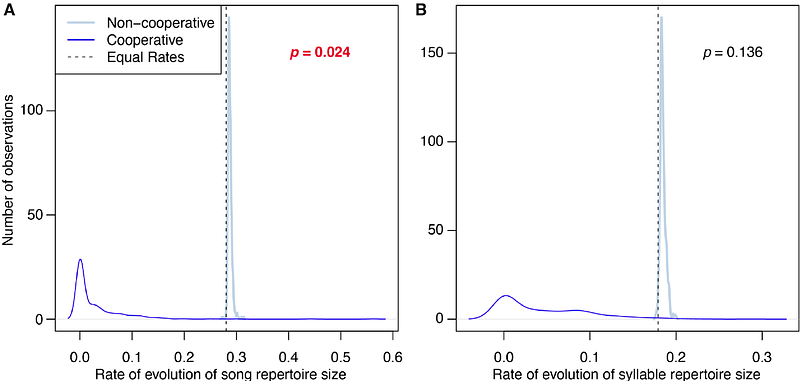Cooperative breeding in songbirds promotes female song but slows the evolution of song elaboration

Cooperative breeding in songbirds promotes female song but slows the evolution of song elaboration
Snyder, K. T.; Loughran-Pierce, A.; Creanza, N.
AbstractBird song has historically been characterized as a primarily male behavior that evolves through sexual selection pressures involved in mate attraction. More recently, researchers showed that female song is far more prevalent in songbirds than previously thought, raising new questions about how other social functions of birdsong and sexual selection pressures on females might affect song evolution. Certain breeding systems, particularly cooperative breeding, are hypothesized to change social dynamics and sexual selection pressures on males and females and may thus influence song evolution in both. Here, we construct a large-scale database synthesizing species-level information on the presence of female song, the characteristics of presumably male song, social variables, and breeding systems, and we perform comparative phylogenetic analyses. Our results suggest that cooperative breeding and female song co-occur significantly more than expected and exhibit co-evolutionary dynamics; in particular, cooperative breeding appears to decrease the likelihood that female song is lost. Notably, we find evidence that these trends might be linked to certain social features associated with cooperative breeding, including social bond stability, but not others, such as increased group size. In addition, we observe that song repertoire size appears to evolve more slowly in cooperative breeding lineages. Overall, our findings demonstrate that cooperative breeding may have complex and sex-specific effects on song evolution, maintaining female song while slowing the rate of male song elaboration, suggesting that song in cooperatively breeding species could function in ways that differ from the traditional mate-attraction paradigm and that lesser-studied functions of songs may be evolutionarily consequential.


